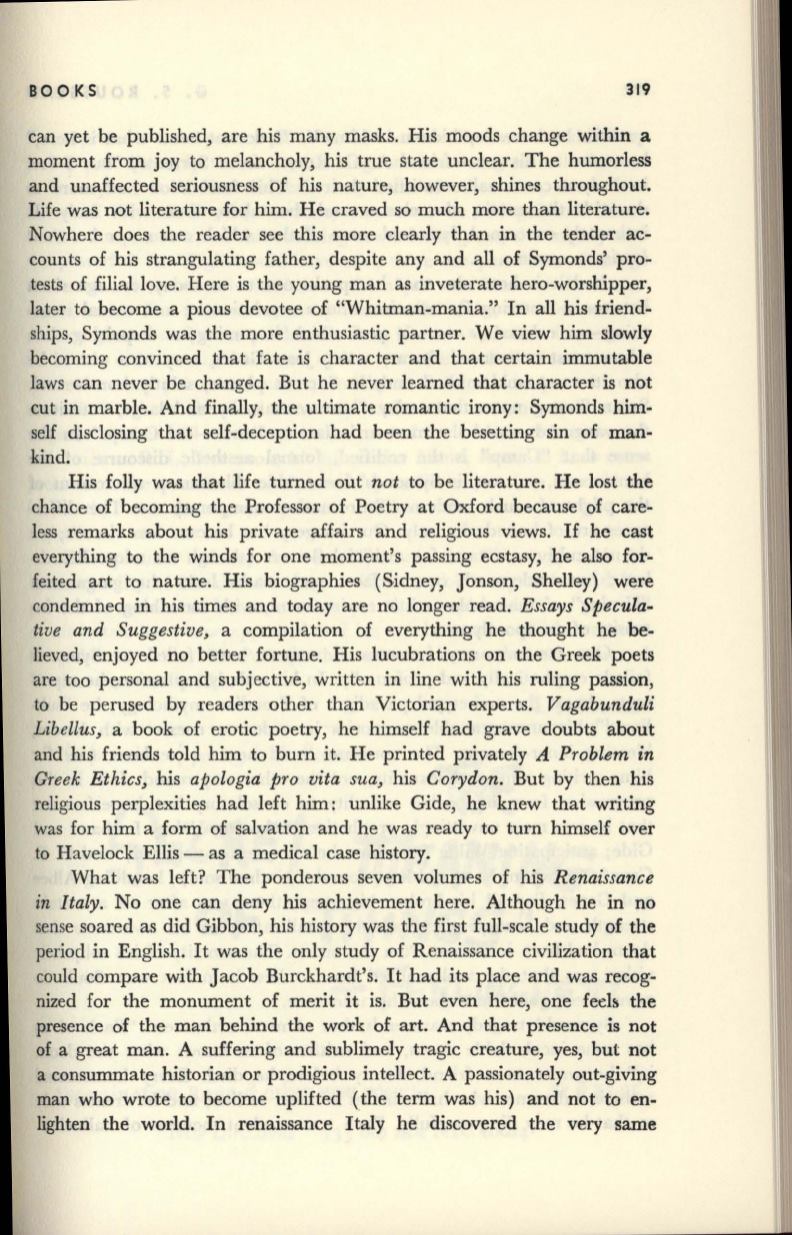
BOO KS
319
can yet be published, are his many masks. His moods change within a
moment from joy to melancholy, his true state unclear. The humorless
and unaffected seriousness of his nature, however, shines throughout.
Life was not literature for him. He craved so much more than literature.
Nowhere does the reader see this more clearly than in the tender ac–
counts of his strangulating father, despite any and all of Symonds' pro–
tests of filial love. Here is the young man as inveterate hero-worshipper,
later to become a pious devotee of "Whitman-mania." In all his friend–
ships, Symonds was the more enthusiastic partner. We view him slowly
becoming convinced that fate is character and that certain immutable
laws can never be changed. But he never learned that character is not
cut in marble. And finally, the ultimate romantic irony: Symonds him–
self disclosing that self-deception had been the besetting sin of man–
kind.
His folly was that life turned out
not
to be literature. He lost the
chance of becoming the Professor of Poetry at Oxford because of care–
less remarks about his private affairs and religious views.
If
he cast
everything to the winds for one moment's passing ecstasy, he also for–
feited art to nature. His biographies (Sidney, Jonson, Shelley) were
condemned in his times and today are no longer read.
Essays
S
pecula–
tive and Suggestive,
a compilation of everything he thought he be–
lieved, enjoyed no better fortune. His lucubrations on the Greek poets
are too personal and subjective, written in line with his ruling passion,
to be perused by readers other than Victorian experts.
Vagabunduli
Libellus,
a book of erotic poetry, he himself had grave doubts about
and his friends told him to burn it. He printed privately
A Problem in
Greek Ethics,
his
apologia pro vita sua,
his
Corydon.
But by then his
religious perplexities had left him: unlike Gide, he knew that writing
was for him a form of salvation and he was ready to turn himself over
to Havelock Ellis - as a medical case history.
What was left? The ponderous seven volumes of his
Renaissance
in Italy.
No one can deny his achievement here. Although he in no
sense soared as did Gibbon, his history was the first full-scale study of the
period in English.
It
was the only study of Renaissance civilization that
could compare with Jacob Burckhardt's. It had its place and was recog–
nized for the monument of merit it is. But even here, one feelli the
presence of the man behind the work of art. And that presence is not
of a great man. A suffering and sublimely tragic creature, yes, but not
a consummate historian or prodigious intellect. A passionately out-giving
man who wrote to become uplifted (the term was his) and not to en–
lighten the world. In renaissance Italy he discovered the very same


